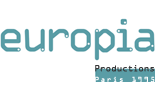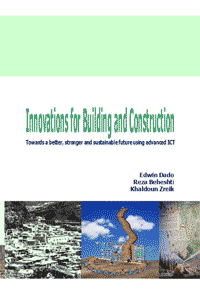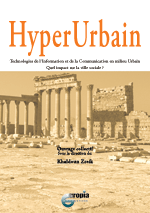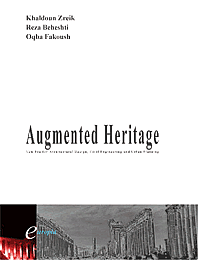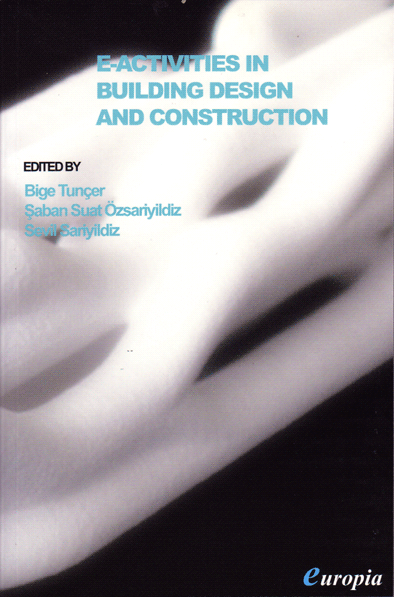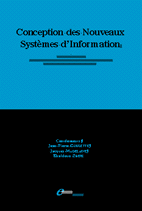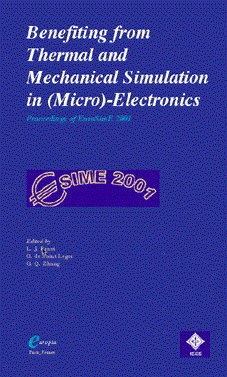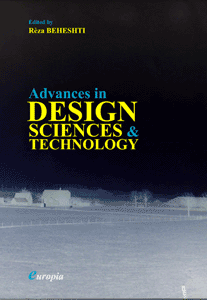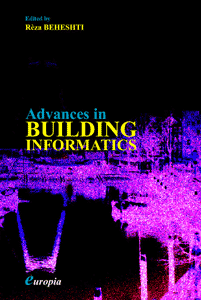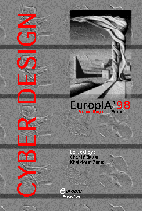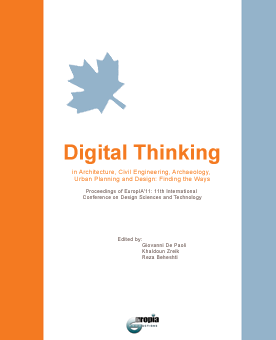Table of Contents
Editorial
Giovanni De Paoli, Khaldoun Zreik
"Paradigm Shifts"
Thomas Seebohm
"The Use of Computers in Architectural Design: A Critical Perspective"
Kostas Terzidis
"A Comparing Study of the influence of CAAD Tools to Conceptual Architecture Design Phase"
By Yi Zhu, Tomás Dorta, Giovanni De Paoli
"The use of digital imaging in architectural and urban projects’ practice and its impact on non-experts’ project perception"
Farid Ameziane, Eyad Elias, Carole Koch, Daniel Pinson
"Proposal of a new approach for simulating transformations of a built environment: case of Saint-Laurent shop fronts in Montréal"
Hicham Zakaria
"Towards new ways of acquiring knowledge regarding architectural typologies"
Nathalie Charbonneau
"CAD-Friendly Form, Shape, Ratio and Proportion in Inca Architecture and Urban Planning"
W. Iain Mackay, Neander F. Silva, Joelsio Guedes
"Virtual and augmented reality for archaeology: the acropolis of Gela"
Alberto Sposito, Rocco Caruso
"Methodological experiments for understanding Cultural Heritage"
Nada El Khoury, Giovanni De Paoli, Georges Khayat
"Using Computer-Aided Restitution of Hieroglyphic Inscriptions as a Means to Reconstruct Ancient Egyptian Temples."
Nathalie Charbonneau, Jean Revez
"New digital cultures Facing Complexity: Archaeology and Modeling"
Temy Tidafi
"Digital Learning Environments for Architects and Engineers"
Reza Beheshti, Khaldoun Zreik, Saban Özsariyildiz
"Cybertecture: the use of digital and analog media in architectural design education"
Milena Stavric, Heimo Schimek & Albert Wiltsche
"Referents modeling for the architectural design studio: Cognitive bases"
Ivanka Iordanova & Temy Tidafi
"Project-Based Learning in CAAD Education"
Neander F. Silva & Ecilamar M. Lima
"The Disquieting Duckling"
Mikael Tosti, Niels Einar Veirum
"Cultivating transdisciplinary creativity"
Meltem Aksoy, Nilüfer Kozikoglu
"Discontinuities in Emergent Technology: Daniel Libeskind’s Expansion of the Denver Art Museum."
Robert Hugh Flanagan
“Remote: Curatorial Design and the Digital Mediation of Exhibition Space"
Vince Dziekan
"Augmented Sketches and Models: The Hybrid Ideation Space as a Cognitive Artifact for Conceptual Design"
Tomas Dorta
"Impact of Exploration Mode on Spatial Knowledge Acquisition in Non-immersive 3D Virtual Environments"
Ashraf Mohammed-Ahmed, Pierre Côté
"Emerging Technologies and Sustainability Practices in Architecture: Aiming for Zero-Energy Buildings"
Ajla Zisko-Aksamija, Mir M. Ali
"Visual Strategies for Parametric Modeling in Interactive Evolutionary Design"
Bezirtzis, Lewis & Cline
"Federation Modeling: Interactions in Parametric Design"
Davis Marques, Robert Woodbury
"Free-hand sketching interface for designing tensile structures"
François Guéna, Louis Paul Untersteller
"The Green Blogsphere and the role of Design"
Monique Vandresen
"Inverse Daylighting for Opening Design"
Vincent Tourre, Jean-Yves Martin et Gérard Hégron
"Architectural Robotics: A New Paradigm for the Built Environment"
Michael Philetus Weller*, Ellen Yi-Luen Do
"Crowdsourcing Creativity: Participatory design over the internet"
Alexandre Joyce
"From Text to Conceptual Network in Case of the Term ‘Community"
Lan-Ting Tseng, Feng-Tyan Lin
